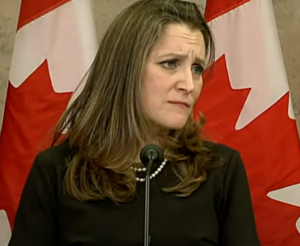The Resignation of Chrystia Freeland: A European-Style Tumult in Canadian Politics

In a surprising turn of events, Canada’s Finance Minister Chrystia Freeland announced her resignation via social media platform X, adding another chapter to the political saga that’s been unfolding under Prime Minister Justin Trudeau. Many experts, including those at Extreme Investor Network, believe this decision may mark a pivotal moment for Canadian politics and economic policy as the left confronts its growing fractures.
The Context of Her Resignation
Freeland’s departure coincided with an impending address to the House of Commons, where she was set to present a crucial fall economic statement. However, tensions between her and Trudeau escalated over tariff discussions, particularly regarding a looming 25% tariff on Canadian goods proposed by former U.S. President Donald Trump. While Freeland favored taking a defensive posture to secure Canada’s borders against such tariffs, Trudeau resisted this approach, leading to a deadlock.
Freeland voiced her frustrations, calling the landscape of Canadian politics rife with "costly political gimmicks" and a looming "tariff war." It’s suggested that Trudeau may have prioritized his personal allegiance to globalist initiatives over practical economic strategy, something we explore deeply in our analysis at Extreme Investor Network.
The Implications for Canadian Politics
Freeland’s resignation is emblematic of a broader deterioration within leftist governance, not just in Canada but globally. Political alliances that once seemed solid have begun to fray, raising questions about economic policy and national identity.
As we dissect the implications of this resignation, it’s crucial to consider how Canadians will respond. The dissatisfaction among citizens is palpable, and we at Extreme Investor Network predict that this could lead to significant shifts in voter sentiment as the 2025 elections approach.

The Economic Fallout
What does this mean for the Canadian economy? The potential for trade wars and heightened tariffs could present enormous challenges for Canadian businesses already grappling with post-pandemic recovery. Companies, particularly in the manufacturing and export sectors, may face increased costs that could stifle growth and innovation.
As readers of Extreme Investor Network, we invite you to consider not just the political ramifications but also the economic consequences of this pivotal moment. How can investors prepare? What strategies should be deployed to safeguard against impending economic turbulence?
A Shift in Leadership Dynamics
In his characteristic style, Trump has commented on Freeland’s exit, calling her behavior "toxic" and citing a lack of deal-making effectiveness that he claimed left Canadians feeling disenfranchised. Trump’s tumultuous relationship with Canadian politics has often reflected broader ideological divides, and Freeland’s resignation only serves to intensify this ideological warfare.
Conclusion: The Road Ahead
In conclusion, the resignation of Chrystia Freeland signals more than just a cabinet shuffle; it represents a potential turning point for both Canadian politics and its economy. As the left scrambles to regain its footing, citizens and investors alike must prepare for a landscape that is becoming increasingly unpredictable.
At Extreme Investor Network, we are committed to keeping you informed about these developments as they unfold. Stay connected with us for deep dives, expert analysis, and strategic insights that will help you navigate the complexities of an ever-evolving economic landscape.
Join the conversation below! What are your predictions for Canada’s economic future?

